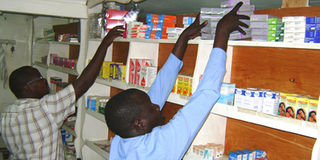Pharmacist tells how to identify fake drugs shop

Photo/FILE
Pharmacy and Poisons Board Drugs Inspectors Peter Adoki (right) and Nicholas Kibet inspect drugs at a chemist in Eldoret town on July 30, 2009. They impounded both counterfeit and expired drugs.
Caution: During your next visit to a pharmacy, ensure the premises’ licence is visible and that you get a receipt showing the name of the drug purchased.
Dr Jayesh Pandit, the head of the pharmacovigilance department at the Kenya Pharmacy and Poisons Board, on Wednesday asked Kenyans to take part in the fight against counterfeit drugs by buying from licensed pharmacies.
Pharmacovigilance is the department charged with creating awareness on medicine safety.
“Medicines should only be bought from licensed pharmacists, who wear badges branded by the Pharmacy and Poisons Board,” Dr Pandit said.
He was speaking on the sidelines of a two-day conference that began on Wednesday, and which seeks to discuss the risks that counterfeit medicines pose and develop action plans to address the problem.
The World Health Organisation defines counterfeit medicine as “medicine which is deliberately and fraudulently mislabelled with respect to identity and/or source”.
“Counterfeiting can apply to both branded and generic products and counterfeit products may include products with the correct ingredients or with the wrong ingredients, without active ingredients, with insufficient active ingredients or with fake packaging,” the global body warns.
China, India, Colombia, South America and Egypt are some of the sources of most of the world’s counterfeit goods.
In March, the Kenyan Association of Pharmaceutical Industry estimated that counterfeit pharmaceutical products accounted for approximately Sh9 billion in sales annually.
The conference that continues on Thursday at Nairobi’s Panafric Hotel has participants from Burundi, Rwanda, Madagascar, Kenya, Tanzania and Uganda.




